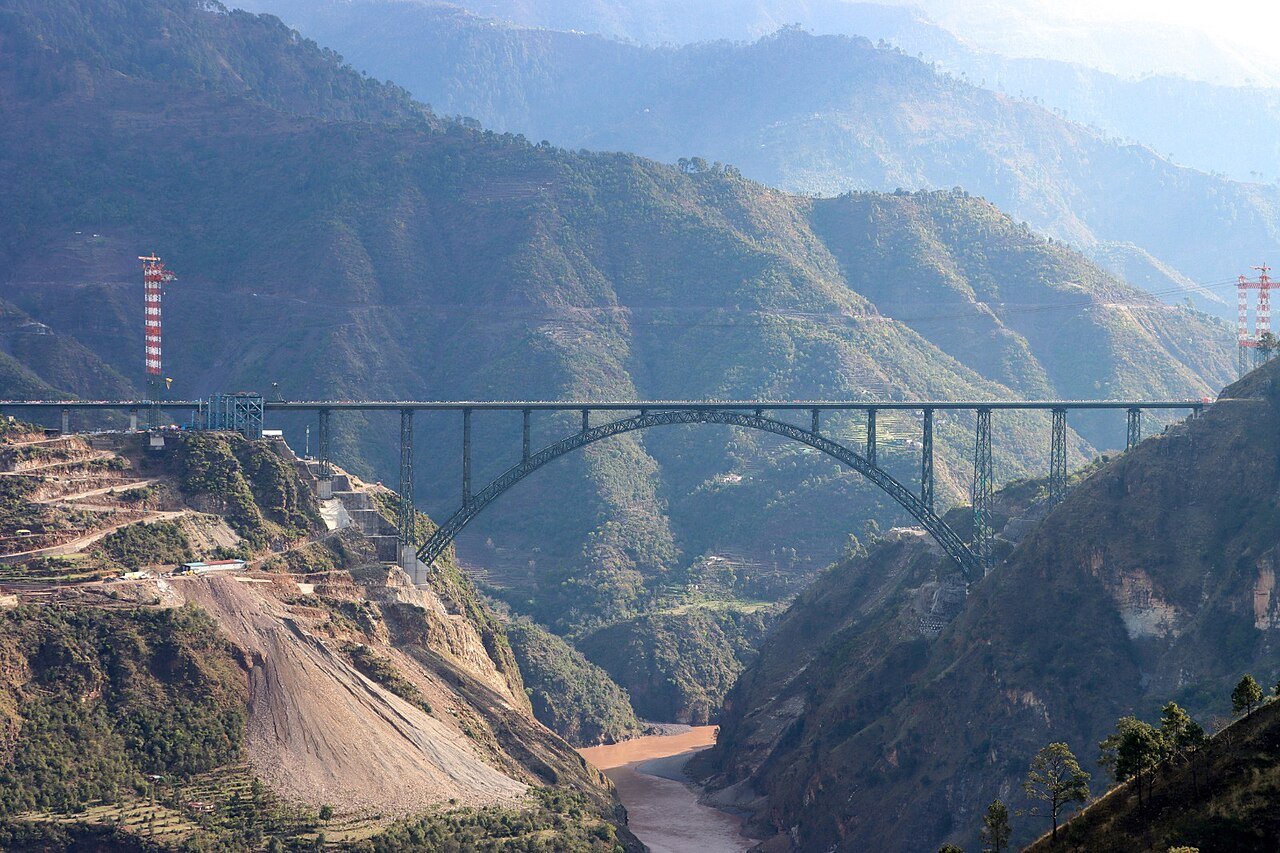Rising 359 meters above the roaring Chenab River in Jammu & Kashmir, India, the Chenab Bridge is a testament to human ambition and engineering prowess. Once operational, it will redefine rail connectivity in the challenging Himalayan terrain, slashing travel time between Kashmir and the rest of India.
Location and Strategic Context of Chenab Bridge
- Situated on the Udhampur–Srinagar–Baramulla rail link
- Spans the Chenab River gorge, 50 km southwest of Katra
- Part of India’s ambition to integrate the Kashmir Valley with national rail network
Chenab Bridge – Engineering Marvel
The Chenab Bridge pushes the envelope of steel-arch design. Key innovations include:
- High-Strength Weathering Steel: Resists corrosion in extreme Himalayan climate.
- Seismic-Resistant Foundations: Bearings and dampers to withstand earthquakes up to magnitude 8.0.
- Advanced Finite Element Modeling: Predicted load distribution and wind-induced vibration.
- Modular Assembly: Steel segments fabricated off-site and lifted into position by 600-tonne capacity cranes.
Construction Challenges and Solutions
- Remote Himalayan Terrain • Solution: Helicopter-borne delivery of critical components.
- Unpredictable Wind Speeds (up to 266 km/h) • Solution: Wind tunnel testing of scaled models; tuned mass dampers.
- Cold-Weather Welding • Solution: On-site pre-heating tents and specialized welding electrodes.
- Logistics During Monsoon • Solution: Elevated access roads and rock-bolted pathways to maintain supply chains.
Significance for Connectivity and Economy
- Travel Time Reduction: Cuts journey between Srinagar and Udhampur by nearly two hours.
- All-Weather Link: Bypasses snow-choked mountain passes, boosting year-round tourism.
- Economic Uplift: Facilitates movement of goods, energizes local industries, spurs job creation in Jammu & Kashmir.
Safety, Maintenance, and Monitoring
- Real-Time Structural Health Monitoring: Sensors track stress, temperature, and vibration.
- Periodic Ultrasonic Inspections: Ensures weld integrity in arch segments.
- Lightning Protection System: Shields steel components against frequent Himalayan thunderstorms.
Contribution of Dr G Madhavi Latha
Dr G Madhavi Latha, a geotechnical and rock-engineering specialist from the Indian Institute of Science, Bengaluru, served as the chief geotechnical consultant on the Chenab Bridge project for 17 years—advising on slope stabilization, foundation design, and a “design-as-you-go” approach to tame the Himalayan terrain.
Future Outlook
Once operational, Chenab Bridge will not only stand as India’s most ambitious railway project but also inspire future high-altitude infrastructure—from mountain tunnels to cantilevered road bridges. Its lessons in modular assembly and seismic design have global relevance, especially in other mountainous regions.
| Project Name | Location | Type | Status |
|---|---|---|---|
| Mumbai Trans Harbour Link | Mumbai, Maharashtra | Sea Bridge | Under Construction |
| Delhi–Meerut Expressway | Delhi–Uttar Pradesh | Expressway | Operational |
| Chenab Rail Bridge | Jammu & Kashmir | Rail Bridge | Near Completion |
| Bharatmala Pariyojana | Pan-India | Highway Network | Ongoing |
| Dedicated Freight Corridor | Eastern & Western Corridors | Rail Freight | Partially Operational |
Conclusion
The Chenab Bridge encapsulates the intersection of daring vision and meticulous engineering. As the world’s highest railway bridge, it proves that even the most forbidding landscapes can be stitched together, forging new pathways for people, trade, and progress.
Read Also-
Civil Engineering Interview Questions for Professionals
Geotechnical Engineering Interview Questions
World’s Top 10 Tallest Buildings – 2025
What Is a Culvert? Definition and Technical Criteria
Impact Factors Applied to Bridge Loading
